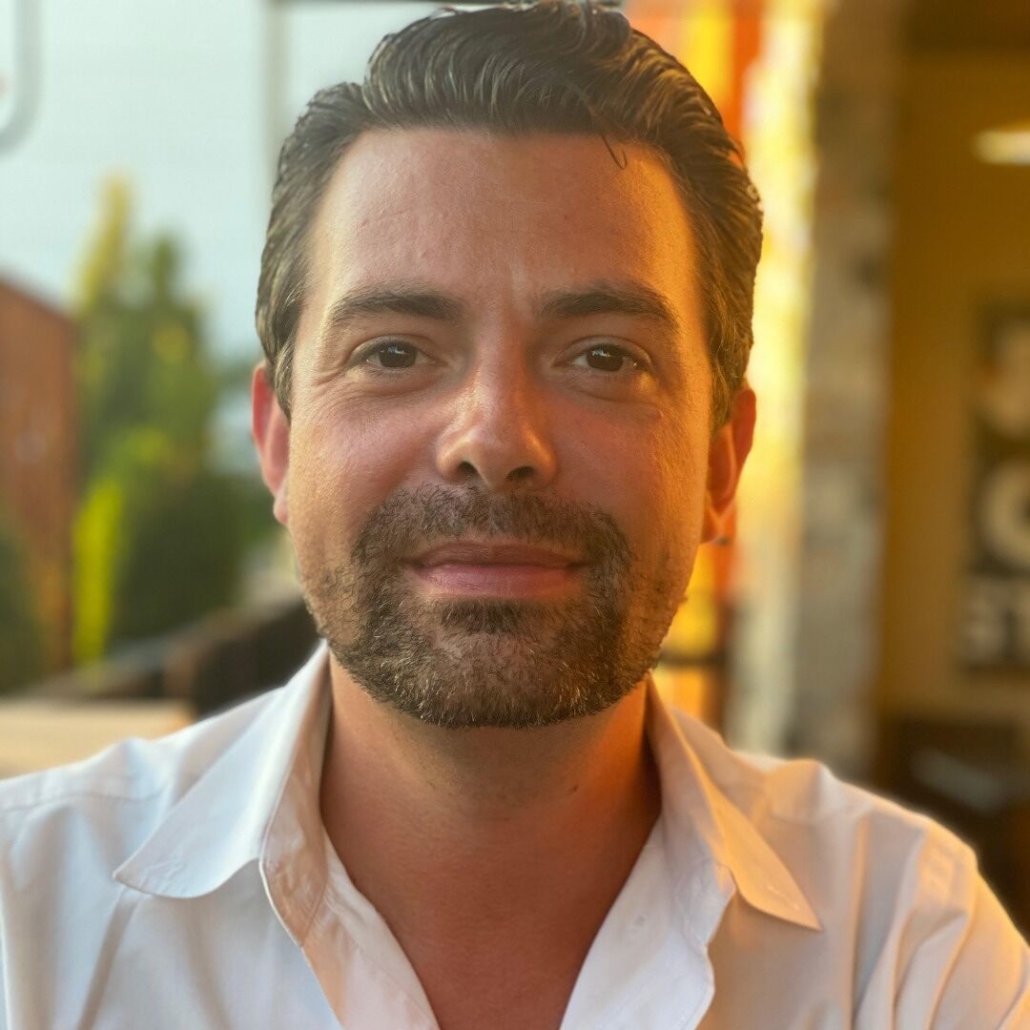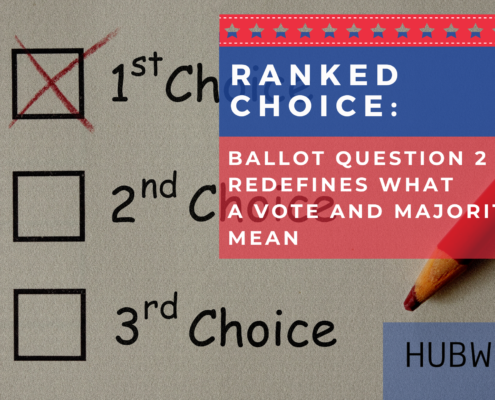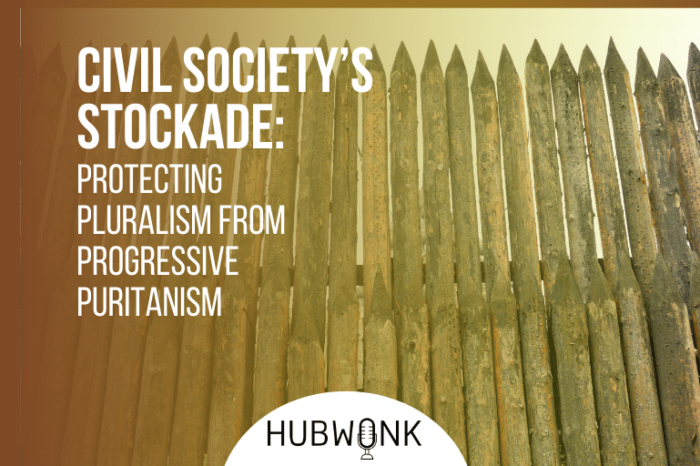Civil Society’s Stockade: Protecting Pluralism From Progressive Puritanism
/in Featured, Podcast Hubwonk /by Editorial StaffThis week on Hubwonk, host Joe Selvaggi talks with Noah Rothman, associate editor of Commentary magazine, about his recently released book, The Rise of the New Puritans: Fighting Back Against Progressives’ War On Fun, examining how the attempt to remoralize American culture mirrors similar social movements in the past and what concerned onlookers can do to better manage this frenzied phenomenon.
Guest:
 Noah Rothman is the associate editor of Commentary magazine and a contributor to MSNBC. His work has been published in Townhall Magazine, USA Today, National Review, The Washington Examiner, The New York Post, The New York Times, The Atlantic, and The Washington Post. He is the author of Unjust: Social Justice and the Unmaking of America (Regnery, 2019) and The Rise of the New Puritans: Fighting Back Against Progressives’ War on Fun (Broadside, 2022). Mr. Rothman graduated from Drew University with a degree in Russian Studies and political science (2004), and he earned a graduate degree from Seton Hall University in diplomacy and international relations with a focus on security policy in the former Soviet space (2010). He lives in New Jersey with his wife and his two sons.
Noah Rothman is the associate editor of Commentary magazine and a contributor to MSNBC. His work has been published in Townhall Magazine, USA Today, National Review, The Washington Examiner, The New York Post, The New York Times, The Atlantic, and The Washington Post. He is the author of Unjust: Social Justice and the Unmaking of America (Regnery, 2019) and The Rise of the New Puritans: Fighting Back Against Progressives’ War on Fun (Broadside, 2022). Mr. Rothman graduated from Drew University with a degree in Russian Studies and political science (2004), and he earned a graduate degree from Seton Hall University in diplomacy and international relations with a focus on security policy in the former Soviet space (2010). He lives in New Jersey with his wife and his two sons.
WATCH:
Get new episodes of Hubwonk in your inbox!
Read a Transcript of This Episode
Please excuse typos.
Joe Selvaggi:
This is Hubwonk I’m Joe Selvaggi.
Joe Selvaggi:
Welcome to Hubwonk, a podcast of Pioneer Institute, a think tank in Boston. To HL Mencken, puritanism was the haunting fear that someone somewhere may be happy. Indeed Puritans remain notorious, not for the purity of the society they endeavored to create, but rather for the notorious harshness of their societal strictures in our modern times, a new, similar cultural movement is emerging to challenge American societal norms, a world, and a generation away from the moral majority of the Republican Right of the 1980s. A new moral crusade is emerging from the political left, united by the quest to establish social ideological purity. Modern activists set out to police are public spaces to call out those who espouse ideas outside their progressive orthodoxy and publicly punish any perceived transgressors in any way possible. Not content to solely target high profile public figures, these new religious enforcers unleash their wrath on any disobedient actors from small business owners to hobbyists to those in the creative class, whenever their work fails to sufficiently acknowledge the systemic flaws and collective crimes recognized by these modern moralizers.
Joe Selvaggi:
Whereas some may celebrate the left’s departure from the countercultural libertine intuitions of the 1960s. This new fanaticism carries a cost beyond the lack of grace. It shows its victims indeed, by creating a climate of fear. This movement is poised diminish the vitality of the marketplace of ideas and range of artistic expression from all points on the ideological spectrum. Where did this modern crusade originate? What beliefs animate its enforcers and what can the history of similar moral revivals teach us about the likely outcome of this newest movement? My guest today is Noah Rothman, associate editor at Commentary magazine and author of the recently released book, The Rise of the New Puritans: Fighting Back Against Progressives’ War on Fun, in which Mr. Rothman finds many similarities between beliefs and behaviors of the original Puritans who settled in new England in the 17th century and the modern-day purity seekers who live amongst us, but whose power resides in the ever present force of online media. He will share with us how the aspiration for good in society in the past and present can turn the virtuous into villains and moral, less into mobs. When I return, I’ll be joined by associate editor and author Noah Rothman.
Joe Selvaggi:
Okay. We’re back. This is Hubwonk. I’m Joe Selvaggi and I’m pleased to be joined by Commentary magazine’s associate editor, author of a new book entitled “Rise of the New Puritans: Fighting Back Against Progressives’ War on Fun.” Noah Rothman. Welcome to Hubwonk, Noah. Thank you so much for having me, Joe. It’s a pleasure to be here. Wellcongratulations on this new book, I enjoyed it immensely. It was a page turner for me andI actually wound up laughing out loud, which is saying a lot. It does have a serious theme. In factthe subtitle is you are taking aim at the war on fun.
Noah Rothman:
That’s very heartening to hear. Thank you so much. I appreciate it. Fundamentally, this is an attack on sanctimony and there’s no answer to an excess of sanctimony that involves more sanctimony. So I was trying to strike an irreverent tone and I’m, I’m glad it resonated with you.
Joe Selvaggi:
Sure. I think your ambition in the book was clearly stated you hope to have your book canceled. So let’s see what we can do in our conversation to to help catalyze that, that event. So it’s a dense read. It had a lot of great references to history, social commentary plenty of stories on the rise of what you call new Puritan. So for the benefit of our listeners to level set who have not read the book yet, what are you what is your definition of perhaps start with old Puritans and what does the term Puritan mean in your book?
Noah Rothman:
Well, the pur Puritan is both a literal reference to big P puritanism and a figurative reference to the conceptions of puritanism that we have in our minds as just in the popular imagination scholars of the Puritan pur period, get very frustrated at those those stereotypes that we have in our head of, of Puritans, because it more reflects what they became the sort of Victorian era comstockery, the efforts to police public morality in the 19th century that ultimately formed our stereotypical understanding of the blue-nosed prudish Puritanically inclined individual. But both those two things, those two phenomenon are represented and are very resonant and helpful to help us understand what has happened in the last decade. The book begins with a mystery and the mystery is essentially how is it that for all our adult lives, the rightwas the political right conservatives generally we’re inclined to see impropriety and seemingly innocent cultural products that we’re
Joe Selvaggi:
Talking about, the moral majority, right?
Noah Rothman:
The right, the moral majoritarian impulse. And it’s sort of a general tendency, a personality trait, but they would see in, in innocent cultural fair, the capacity to corrupt you, degrade society. That used to be an exclusive tendency to the right, by contrast, the left that had formed its political, it had matured politically in, during the sexual revolution, emphasized self gratification even hedonism for the sake of self fulfillment. It perhaps even at the risk of self destruction. That flipped on its head over the course of the last decade, all of a sudden, we’re now treated to moral crusades from the left, the commanding heights of an American culture, entertainment companies, imposing didactic narratives in media products, so that they serve a higher social purpose than mere entertainment comedians emphasizing the pain that someone had to endure so that you could enjoy something as trite as a punchline, sports coverage that shoehorns prolonged digressions about the lamentable state of American race relations into sports coverage, and when fans object and they do reliably object, they’re explicitly admonished by their betters in this industry for clinging to their need for some escapism over their duty, as moral citizens to dwell on the horrors of existence at all times and in everything.
Noah Rothman:
How did this happen? So this book essentially teases out the theory of progressivism because as the left has identified more with progressive and less with liberalism, they begun to adopt its habits of mind among them a utopianism, a fear of idleness that which is idle, which is not actively contributing to the grand project of our time is, is worse than banal. It is actually detracting from that experience. And this, this trade is accompanied by great displays of, of public labor and profound discomfort. And indeed that is celebrated because it communicates to the outside world, your piety, your discipline, and your commitment to the cause and all ultimately a totalitarian outlook, because this is total. It is not a private practice. You are to be drafted into it. A lot of this has its roots in American puritanism. And in that sense, it is very American. This is not an alien thing to our political culture. And I hope this book kind of helps you identify one gives you license to laugh at it because it is hilarious subjectively funny, but two to help you understand that this is not some, an alien species that has taken over the host here. This is a feature of the American political outlook.
Joe Selvaggi:
So the indeed, but while both in the past, we have used the term Puritan and the pejorative and in the, in our current conversation your book does acknowledge a lot of positive and noble intent adherence to puritanism, right? It, it’s not that they are, they have evil intent. They genuinely wanna improve the world. In fact, your book’s chapters are organized around what I would call unimpeachable virtues of Puritans. Each chapter is labeled Heidi prudence, austerity, fear of God temperance in order, why did you structure your book around virtues?
Noah Rothman:
Because in the abstract, what the modern puritanical inclined progressive is trying to do is Alize society. It is a rejection of what their parents and grandparents pursued, which a deemphasized morality, conventional definitions of morality, and indeed conventional definitions of social structure in favor of something much more organic and and free wheeling. And, and as such, this new generation is far more our steer than their grandparents than their parents generally actually a little less lascivious and and chill and fun. But nevertheless, what they are seeking to pursue are values that conservatives would recognize as being unimpeachably, as you say necessary to ensure an ordered society, particularly in the chapter on temperance, which is the very salacious chapter on alcohol and sex. We, the, the progressive left has rediscovered a sort of essential truth that conservatives always have known to be true, which is that when you have social settings in which men and women are present, and it’s also bathed in alcohol, really destabilizing things can happen.
Noah Rothman:
Now, this is something that was deemphasized in the wake of the sexual revolution, though, there were intellectuals on the left who protested this sort of license atmosphere that was being cultivated by those who adhered to the so-called Playboy philosophy. But nevertheless, that was not the prevailing ethos. It took over cult, popular culture in the seventies, took over politics in the nineties and was relatively unquestioned until the last decade. But they have since rediscovered these, these ideas about the value of, of labor, about the value of virtue and of and of being pious and humble humility before the forces of, of society, and generally your own place in that society, which is far smaller than what their parents and grandparents believed it to be. It is, it is not as much as it manifests in narcissism. It is not a narcissistic idea. It is an idea about how society should structure themselves. That puts society first puts progressive values first. And that, in that sense, it’s recognizable to social conservatives in particular, because it does mirror and mimic thematically, if not in practice, quite a lot of the values that they hold.
Joe Selvaggi:
So your, your my, my podcast listeners are both a mix of conservatives and progressives. And I think they listen because they like to hear me talk with guests who, and as far as I can estimate haven’t been captured either by the extreme writer, extreme labs, they’re, you know, we have reliable sane conversation. I think my friends on the left are listening for us to have a wonderful condemnation of cancel culture. I think on the, on the left, perhaps they’d want us to have a show, a a careless indifference to the, the, the, the pains of the world. What I like about your book. It, it does neither. It’s neither a, a screen against cancer culture, nor is it something Neith that you glibly dismiss the concerns of the left that you do, neither, which I think is great, but what’s more interesting to me. You have so many stories about how otherwise well-intentioned, I would call them. And I think you call them in your book, self professor liberals got swept up in this movement that seems to show no mercy for the the intent or the, the context and it demands complete retribution. Their score seems to gravitate both at right and left. Why is the new puritanism, so indiscriminate? Why does it not care who it’s it’s gotten its, its target?
Noah Rothman:
Yeah, so so there have been a lot of scholars who I admire, who have talked about this new ethos, overtaking the left as though it is essentially indistinguishable from a secular religion. And I take a little bit of issue with this. I do acknowledge that there are features of it that mimic a secular faith. But there’s there’s more to it than that, that transcends religious practice transcends political practice which is also why I relied on the theory of puritanism to help make sense of this thing, because it is, it is both of those. It is all of those. It is a theory of social organization that ex that goes beyond the practice of religion, then practice of politics is both, but it doesn’t have a pathway for absolution as traditional religions do. And the Western context that usually comes from ideaism and ideaism is utterly absent from this theory.
Noah Rothman:
So what you’re left with are the trappings of religious practice. Most of which are rather arduous and to an outside observer they appear entirely fanatical. They, they look to them to the initiated amongst the progressively inclined Puritan, like a mark of their seriousness their general sobriety and seriousness of purpose, but it looks to us like madness. So what you’re left with are the the theatrical, the dramaturgy around the practice of this this new theory of social organization, the work quote unquote, the work, which is a display of great labor and profound discomfort in the pursuit of a spiritual goal displays of self deprivation, a willingness to sacrifice that, which you find enjoyable and to force others to forego that, which they find enjoyable in order to enforce and build a monoculture that is ostensibly defined by cultural competence and wisdom, but is generally laborious to adopt demographic essentialism in the form of sanctuary laws.
Noah Rothman:
Your sartorial choices are supposed to express your accidents of birth, who you are and to whom you are subordinate and the projection of inward insecurities, a scholar that I, that I quote rather frequently throughout the book defined one of many traits that that were typical typified puritanism as quote, anxious, introspection, which manifests in practice in this idea among those who have this secret decoder ring that can peel back the curtain in the world that they can see in the banal, the most banal of activities beneath its Placid surface, the the sinful origins of these practices, many of which are rooted in America’s original sins. So that’s how you get the idea that jogging is racist. That gardening is a, is a, a, a misuse of your time and subordinates minorities, and is oppressive. That sewing and knitting are imbued with bigotry. These are sort of things that make almost no sense to anybody who’s not steeped in this Milu, but once you’re steeped in this Milu, you can see it, and it provides you with a sense of exclusivity and a sense of purpose.
Joe Selvaggi:
So I, I, I think our listeners are there, eyes might be rolling back in their head saying, oh, you guys talking lot a lot about theory, give us some substantial stories. Your book is, is replete with wonderful stories of what at first glance, one might say is nut picking some sort of incredible story of one person who you know, unfortunately steps says the wrong thing is cast aside forever, but share with our listeners, it’s your pick, you’ve got so many in your book. One that comes to mind that sort of illustrates this sort of for lack of a better term, almost a Salem witch trial characteristic, where, where, and otherwise unwitting person who, whose heart’s in the right place, winds up, having his life ruined because of of, of course this, the sentiment of the, of the Puritan mob, if you
Noah Rothman:
And I appreciate that. I go out of my way to ensure that nut picking does not appear in this book, you will not be treated to a random Twitter controversy. Most of the time in this book, I think perhaps maybe once or twice, I might be guilty of that, but I went very far in excess to attempt to avoid that the book, the first chapter opens with several stories that come to mind. The first being that Amadi Wajdi, who is a grocer in Minneapolis, he was featured in on television. He was feted on the floor of the U of the us house. He was a fixture in his community. He had a daughter who was working at his grocer, who twice in her youthat 14 and 18 respectively, a young adult used racial slurs on online that came to the attention of activists who demanded a variety of retribution from him.
Noah Rothman:
He was eventually compelled to fire his own daughter. That was not enough though. She was dedicating her life to the good noble works around repentance. His, his lease was eventually canceled. This was the punishment befitting, the sin, the careless parentage of a willful daughter. Likewise the the soccer player, Alexander QAI, who was cut from the Los Angeles galaxy team because his wife, a Serbian national who only spoke Serbian, said a bunch of racist things during the 2020 riots. And they were racially insensitive. But he was compelled to denounce his spouse. And when that was not good enough, he too suffered the loss of his career because of, again, a sin befitting, the crime, his association, with a woman of ill repute. The principle at work here is usually defensible the principle, let’s say, and the example of let’s take the 2020 riots for example, and the reaction to their response, which was a reaction against police violence.
Noah Rothman:
The principle that was advocated here is good and noble. It is that police should be subordinate to the communities they serve and responsible to the politicians. They elect no one objects to this principle, but in practice, it manifested in ways that emphasized the display the theater around it, and the virtue of those who would engage in that display. So the New York times produced one such very humiliating episode actually before the New York times. One of this, the way in which it’s manifested isn’t in legislative reforms, or even in protests, outside in the streets, both of which are kind of unconventional it manifested in the commanding Heights of American culture, trying to purge from, from cultural products, the quote, good cop archetype. This is again taken from the New York times so that we don’t, we’re not accused of nut picking. The good cop archetype was present in scripted television programs, which engaged in, in a garment rendering, agonizing circular, fine squad over whether police shows should even exist.
Noah Rothman:
The PR the police program live PD and cops were both canceled, both of which were accused of having a theoretically advanced, the notion that police are, are are, are moved to violence by the existence of these programs, the tangible good that they had done finding at large criminals solving cold cases, finding missing persons that was disregarded the tangible good was subordinated to the theory, the theory one out and in its most ridiculous manifestation. Again, the New York times goes out highlights the backlash against Nickelodeon’s cartoon show Paul patrol. It was an effort to, to get the, the, the first responders, cartoon dogs as first responders to get them off television, because they were somehow corrupting society with their good cop archetypes. This is a display of personal anguish and personal self deprivation and personal a big booming parade of sanct that ended up undermining the principle that was at work here. The principle became subordinated to this big display of piety to the point where one must conclude the piety is the point.
Joe Selvaggi:
So forgive me you know, I’ll confess that I have a, more of a, an economist perspective of human behavior that people make choices, you know, some better choices than others, but that optimize their own happiness or their perception of their own happiness. What could be the possible logical or practical reward for AISE oneself and essentially, you know, embracing Puran values, Purton like values in one’s own life. And then also insisting others practice the same for lack of a better term faith. Why do we wanna make ourselves miserable?
Noah Rothman:
Yeah, well, they are psychosocial in, in self deprivation, you commit yourself to understanding the needs of others that are going unmet in purging culture of its vulgarity and modesty which in many ways, this, this new puritanical movement has succeeded in doing you commit yourself to the pursuit of a a more noble iJust world. There is a, there is psychological value to this in, in, in the forms of, of labor that you do the work as it were, which never ends indeed cannot end and must involve in the, in the words of its own advocates must involve pain. It is an uncomfortable process to which you must commit yourself for the rest of your life. You engage in a far off journey that provides you with a fuller understanding of the world around you. This is the essence of all religious practice and anybody who is favorable to religious practice, or at least isn’t bigoted against.
Noah Rothman:
It would find nobility and in, and self self fulfillment and purpose in this because it is in the abstract, the pursuit of good, good works. And if you erect a social structure around it, there are tangible rewards for being a good upstanding member of this this social contract. So that, and, and of course the psychological benefits of having the exclusivity of being one of the few who can see through the hitting workings of the world to identify their hideous machinations just under the surface, gives you a, a sense of inclusivity that all human beings need. We all need to be part of a club to one degree or another. So it really, isn’t difficult to see the psychological benefits associated with this particular philosophy. Part of the problem is, is that it’s, it’s particular manifestation in this form makes you into an absolutely miserable person to be around.
Noah Rothman:
There is no lightheartedness in this philosophy. You cannot have carefree joy, carefree joy is a sacrifice of your duty to dwell, to conceptualize the miseries about you and in, so doing commit yourself to resolving them in whatever small way you can, but particularly when it comes to the there’s half, a chapter is on food and eating. And most of it is dedicated to what seems to be the activist purpose, which is to remove from the equation, the op the I, the possibility that you might forget for even a fleeting moment, the pain of existence in an imperfect world. So must always be aware of that.
Joe Selvaggi:
I wanna come back to that because it’s a very important point, but I just, on this point of, of why someone would deliberately make himself or herself miserable, I think he make a great point in the book in that this sort of search for perfection oneself and in the world. It, it, doesn’t actually just, it is not merely incumbent on us to, to act, but on, on everyone effectively, if, if you’re indifferent to this the puring, cause you’re not merely not part of the solution. You are part of the problem in, in that context. You point out that with the effect of this is it makes everything political, literally there’s nothing. And you, you allude to the point of you know, food or music or, or anything, you know, everything becomes political in this new rubric of, of, of morality.
Noah Rothman:
Political is the right word for it, too. Politics is not, we’re not talking about politics properly. Understood. We’re not talking about governmental or legislative affairs or electoral outcomes. We’re talking about political themes and you have to squint a little to see it, but it’s not as though it isn’t there. The problem is, is that this movement has imbued world historic import and meaning and intentionality in the forces that culminated in your burrito. I guarantee you, your burrito does not have the social political and historic significance that this movement has imparted has as imposed on it. Part of the series of recommendations I, I leave the reader with in the final chapter is to reconceptualize politics as politics, we have expanded the definition of what constitutes politics beyond that, which has some legislative remedy, at least in the American context, with our limited and constrained constitutional government.
Noah Rothman:
So you create a, a set of psychological conditions that cannot be met. And one of two things happens to you when you convince yourself of this grand historic moral import, that these institutions are not responsive to one, you just withdraw, you get really depressed and despondent and say, listen, these, this, this whole system is rigged. It’s not doing what I believe needs to be done with every fiber of my being. And then you, you, you back out of the process, the second reaction, which is slightly more dangerous is to radicalize, to resolve, to attack the foundations of these holy and moral institutions that are not responding with proper equity to your absolute moral imperatives. And that’s pretty much who we’re left with the despondent people that draw withdraw from the system, the fanatics reengage. So we’re left with a, a, a preponderance of fanatics who do not represent the American electorate at large. They’re just the last people in the room yelling at each other. And it creates a distorted perception of what our politics is and what our politics can achieve. So the idea here is to re reorient the, the di the dialogue in the nation or around that, which is actually politics and leave the political for the entertainment class.
Joe Selvaggi:
Well you, you point to the all encompassing influence of, of this new purism but you, you know, this may invade ordinary people’s lives in, in many subtle ways. You, you go into great lengths talking about, you know, life’s enjoyment among the chief of, among those is, is food and, and all the controversy among let’s say, perhaps high minded or, or, or high level Epicuren magazines or, or, or books, or, or restaurants. Again, you, your, your book is replete with these kinds of questions, but I think many of us know people who have become vegans and I think sort of as sort of a gesture to either environmentalism or, or, or something of that nature. But I think more importantly you point out that vegans are people who are trying to move away from meat seem to delight in the fact that though it may be having a, a, a positive externality XLE elsewhere. It, it tastes like hell. So that’s part of the joy of it. Meaning if it tasted good, it wouldn’t be as virtuous. The fact that being a vegan is a miserable way to eat actually makes it that much more appealing, which seems counterintuitive, but, but say more about this sort of the essence.
Noah Rothman:
Yeah. I don’t actually go into veganism because in my affection for south Asian food Buch can make actually very attractive vegan food. That, that is more more applicable in the advocacy around insect consumption. So first let’s go to meat. The scientific rationalizations for abstaining are extremely dubious. The notion here that we could, if we were to rapture every cow in America, out of existence, the impact it would have on greenhouse gas emissions is negligible. Most greenhouse gas emissions are produced by burning fossil fuels. We know this likewise the health effects, the negative health effects on you and its effect on health insurance premiums in the risk pool are, are rooted on confidence, inter intervals that are very low and subsequent re re reexamination of the studies that that suggests that your health is, is significantly negatively impacted by semi routine though.
Noah Rothman:
Not excessive red meat consumption are very low. And if you scratch at the surface of the people who make the arguments around the idea that meat eating is an attack on the climate and makes of you makes a, it has health defects ultimately becomes the language of morality in very short order. You scratch at the surface of these arguments and meat eating is revealed to us as sin. It is an affront to the Eden into which we were born. It is a callous pleasure that makes you a burden on your neighbors. It is a display of wanton cruelty to animals especially when there’re alternatives like this nacent cellular meat technology. This is the language of morality, indeed. This is the language of American puritanism. And the, you know, when we get into bug eating, which is supposed to be the supplement for red meat that will save the planet.
Noah Rothman:
In fact, saving the planet is very frequently emphasized above the idea that this experience will be remotely pleasurable for you most likely, because it will not be remotely pleasurable for you, but pleasure is beside the point. It is about saving the world repeatedly and, and throughout the, the chapter on, on this phenomenon, what is emphasized here is the enjoyment you will take from your contribution to a social good, not the self fulfillment. You will derive from a pleasurable experience, even sitting in front of a table full of friends and, and colleagues and associates who do nothing but comfort. You is considered to be an abdication of your moral responsibility. Enter the organization, race to dinner, which makes offers mostly well-meaning democratic liberal women who have, have no problems with racial issues in their lives. Sits them down for the to a dinner with two racial consultants, racism consultants who berate them over their bigotry over the course of a, of a meal for which they pay the, the privilege of $2,500 to attend.
Noah Rothman:
Because the comfort that you find in me to eating a meal is not, I is, is an abdication of your duty in the, and we have, you know, activists who are creating these dinners now where white people have to pay a ridiculous amount of money for something that black people eat for free because you can’t escape racism, not even in dinner, you have to be constantly confronted with the evils of the world and in pleasurable environments that allow you an escape from that are worse than worthless. They are a contribution to a manifest evil in the world.
Joe Selvaggi:
So I, this is a very interesting concept, but I also wanna contrast it with the fact that if being miserable is, is sort of the, the whole point I think for our friends who are sympathetic to the new Puritans who think, okay, look, you know, so, so they want to memorialize is that all that bad? I do see that, that you could make a persuasive argument to a, a, a, a progressive, that it does more harm than, and then first meets CI you particularly talk about the harm to the areas of the arts, which is easily understood comedians, but even visual artists or, or any number of, of kind of music that it’s constraining creativity. I I’ll, you quote HL Manon often in your book. I just wanna quote, offer my own.
Joe Selvaggi:
I say one of my favorite quotes for him is the greatest artists, the greatest artists of the world are never Puritans and seldom even ordinarily respectable, no virtuous man has ever painted a picture worth looking at or written a symphony worth hearing, or a book worth reading. So in my view it is the unusual people who are perhaps more unorthodox that would be the targets of this new puritanism. And those kinds of folks are, are leaving the field, leaving all of us left and right with lives that are far less rich and enjoyable. Say, say something about the, the harm.
Noah Rothman:
Well, I actually have very little brief for, for HL. Mankin, he’s a source of many pithy quotes, but quite a lot of contempt undue contempt for religiosity in, in ways that I don’t share. Nevertheless what we’re talking about here is the creation, or rather the, a series of imperatives that creators are supposed to observe that produce stultified stilted art. You are one other thing. We’ll go back to the big P Puritans. They left very few art works of art behind. One of the reasons that their philosophy has been so enduring is because they wrote a lot, they were unusually literate, but there were no there were saved for portraiture. There were no you know, stirring works of art, music performance. A lot of that was forbidden. What earned exemptions was, as I said, portraiture, headstones furniture, design the sort of stuff that was meant to record posterity.
Noah Rothman:
It was useful. It wasn’t idle art. It wasn’t beauty for beauty’s sake, which was idleness. And that was a grave sin. It had to comment on the contemporary, it had to convey contemporary morals, contemporary norms, contemporary values, and it couldn’t be subtle because subtlety is something you can’t be trusted with. So what we have today, for example, then this didn’t make it in the book. It’s just a new controversy that sort of arose is executives at Disney pledging to insert LGBTQ themes and characters into their works in very unsettle ways. You need to be beaten over the head with these themes because you can’t be trusted with subtlety. We are to convey a contemporary moral value here. It’s not just art for art’s sake, even if that results in some, in a, in a a, a theme that breaks your suspension of disbelief for a moment, which is something that any artist would stren avoid, but you can’t avoid that anymore because that’s not the social maximum we’re supposed to pursue here.
Noah Rothman:
Likewise the Puritan hostility to theater was rooted in this perception that gender roles were terribly fragile, that you could not mimic this kind of seductive mimicry. And the order of the day was that women couldn’t perform, cuz that would lead to quote HDO. And that men simply couldn’t perform either in part because they had to adopt women’s roles and therefore they had, they would be feminizing themselves. So there couldn’t be any theater at all. This is that conveys a sort of conception of gender as a, as a social contract, perhaps a very mercurial thing, unless you’re bombarded constantly with cultural stimuli that reinforces your gender roles, you see something very similar in how then Puritanically inclined progressive views, transgenderism and views de transitioning, or even people playing or performing roles that are not rooted in their preexisting gender identity of the actor.
Noah Rothman:
Because if you don’t constantly reinforce this belief and the belief among the new Puritanically inclined is that transitioning into the gender of your choice is not a choice at all. It is the fruition of a destiny conferred at birth and anything other that does not reinforce that belief could be terrifyingly damaging. It could produce could contribute to this epidemic of suicides among people who, who are transgendered again, a good virtuous value, but one that is manifesting in worse art, for example you had this very pride profile event in which Scarlet Johansen was denied a role or she was, she was taking a role when she would play a transgender man and the transgender community and, and the artist artists around them were up in arms. They forced her to abandon this project to which she was attached and the project died on the vine.
Noah Rothman:
Now you might celebrate that as the work of inclusivity, but no one gets any work as a result of this transgender people, artists, generally the work dried up. No one’s going to see this performance. No, one’s going to hear this man’s story. Dante Gill forgetting his last name. He was the, the, the, the work was called rub tug, who was a, he was a, a massage parlor owner own a transgender groundbreaker his story will never be made and you won’t see it not on the big screen because transgender activists in the new Puritans for whom they this is a favorite constituency, killed it all in the name of inclusivity. Sure. But inclusivity that resulted in less enjoyment, less work, less art.
Joe Selvaggi:
Yeah, indeed. Well, since your book came out, I think since your book came out, Tom Hanks regretted playing a, a gay man in the film Philadelphia saying only gay men should play gay men on on on the big screen. So yeah,
Noah Rothman:
Precisely it is, it is a puritanical ideal. They would not recognize that in themselves, but that’s vanity and they need to be cured of it. And this book hopefully advances that.
Joe Selvaggi:
So we we’ve been in violent agreement at least in conceptually at high level for this conversation. But I don’t think it’ll be complete if I, I didn’t push back. And if I have a critique with this book, it is in my experience if, if only it were the case that new Puritans practiced what they preached and were sincere in their desire to, to reform the world, Alize the world and practice that my view is there’s a soaring, a level of hypocrisy amongst many of the new Puritans they’ll profess it, for instance, wanna be concerned about the global warming, but live in a 5,000 square foot house with a huge footprint they’ll, they’ll travel to you know Martha vineyard and St. Barts or go to ski, Colorado three times every winter. So essentially have very little actual regard for their, their impact on the planet. But, you know, your, your book seems to give the new Puritans the benefit of the doubt and say, they, they believe what they preach and, and what they demand of others. What, what do you say to that?
Noah Rothman:
Yeah, I think that’s a perfectly fair critique, perhaps one covenant from the Catholic church that would horrify the big P Puritans that the progressively inclined Puritans have adopted is the concept of indulgences. You can, through your own virtue purchase a waiver for yourself and perhaps your IM pious activities that are perhaps hypocritical, but if your heart is in the right place, and certainly if you have enough money you can manage to secure that for yourself. But most of mostly what this movement is fixated on is not itself. It is not inward looking, this anxious, introspection that I talked about before. Doesn’t manifest in in you sitting in a room quietly, contemplating the abject state in which we find ourselves the primary focus of the new Puritan is not them. It is you, you are the problem. You are not living your life appropriately. You are contributing to the degradation of society. You must be reformed they’re on the good side. Intentionally, at least if not in practice, you are neither intentionally nor in practice on the good side. And you are the object of their fixation.
Joe Selvaggi:
Indeed. They, they, they vote for the right party. They drive electric cars. You’re, they’re all set,
Noah Rothman:
Take briefly comedy. I know we’re going very long here. Okay. But there’s a, an, a story from the section on comedy that illustrates this. So there’s a guy named Seth Simon’s who wrote about standup comedy and particularly a colloquial. What was colloquially deemed cringe comedy in the early two thousands. This is a form of humor that leveraged dark humor and speakable things. Homophobias sexism, violence you know, the sort of stuff that you might think would make you a pretty terrible person. If you enjoyed that joke, much less told it, but this is the essence of dark humor. It is to find levity in the depths of American American of the human experience, the great despair and to find something enjoyable in that. And, and funny in that, so that you can endure that, which is unendurable, this is a feature of mankind.
Noah Rothman:
So he finds in this dark humor form the origins of the alt-right and draws a straight line from 2004, where this was a, a popular form of comedy, right to the sacking of the capital building, this black Swan event that had never happened before a profound leap of logic. But nevertheless, that’s his theory, but he does not believe that these standups who are acting out these antisocial behaviors on stage are going to jump off stage and subsequently commit crimes or abuse people or, or degrade society broadly, it’s you, who could be doing that. You are the problem. This is very much akin to what people who are of a, a conservative predilection said about Richard Pryor said about George Carlin, Lenny, Bruce all of whom were targeted by sensor moralizer for their corrupting influence in society, and particularly the flippancy with which they regarded the great evils of our time, even up into and including race. I mean, this was a conservative predilection. It is no longer, it is a progressive predilection.
Joe Selvaggi:
Indeed again, we, we talked about it briefly and as you say, we are running outta time, but I’m old enough to remember growing up thinking the the threat to culture was going to be some drug adult hippie or something like this who stopped at Bour Morris and lived a, you know, terrible Devo life. The more majority seems to have you know, crumbled and this new remedial from the left is coming along. I I’ll ask two questions about how did this happen and my, my going towards my final question, you draw parallels both from the old ascendancy of the old Puritan to the new Puritans, but also the decline of the old Puritans and the new Puritan. So I think you can combine your answer into both you know, how did we shift from moral majority on the right to the left and what are the, the, the seeds of its own destruction that you, you forte in your, in your book,
Noah Rothman:
First of moral enthusiasm around the Dobs decision, not withstanding quite a lot of the conventional culture wars that the right was inclined to wage had declined in importance rapidly. In fact, over the Trump years things like gay marriage, which is now a majority proposition among Republicans, self-described Republicans to say, I have nothing of everybody else divorce which the Thor divorced president of the United States who commands the support of most of the conservative movement, just sort of faded in importance and even abortion. Again, not withstanding this particular new legislative environment that we, that we find ourselves in had declined as a result of declining abortion rates, which had reached their lowest point in 2019. The law does not make an appearance in this book, really very minimally government education, the workplace, unless your workplace creates a cultural product. This book is about the stuff where politics should not be where politics really cannot be, because it, again is not poli is not politics properly understood.
Noah Rothman:
It is merely political. So given these cultural wars, the retreat either either victory defeat or simply capitulation in the culture wars is retreat from the field by the right created a vacuum, and the left has eagerly filled it following this the, the origins of this phenomenon are, are tough to place John, he and Greg lag in their book. The coddling of the American mind identify 2013 as essentially the inception date of this new movement which began mostly on campuses with this conception of safety of conflating conflating emotional duress with literal trauma, right? Physical
Joe Selvaggi:
With violence words, with violence, right
Noah Rothman:
Words with violence and therefore violence with words but conflating nonconformity with Menae and words with trauma, and that migrated off campus and in a spectacular act of piracy these individuals who were trained in the academy to use this language wielded it in, in ways that mimic, I think, emotional and and moral blackmail to take over these institutions, most of which were beholden the, you know, Phil philosophically to this progressive idea of a Alation of society and the, the, the zealots coming up from, from underneath them managed to secure the reigns of power as a result of this language that they were taught to use. So if there’s an inception day and then it’s gen, I think I, I agree with he and lov that that’s where it began, but it has since manifested and, and evolved and manifested into this great role reversal, how the left is getting back in touch with its own morality and more it’s moral obligation.
Noah Rothman:
In fact, to use all of society’s engines harness them towards this one noble end, which is the perfection. And so far as it’s possible of the human experience it is an American idea. This is not again, and is not anathema to the American experience. The fear of this ha this frustration with American American’s origin story on the progressive left has been expanded beyond all rational proportion to all its traditions. If America’s origin is, is tainted in racism and homophobia, sexism, and violence, and all the other things that render the American experience, experiments suspect in the eyes of a very very uncompromising sort of progressive then. So are its traditions. So are its pastime. So are its diversions all are similarly tainted. These are worthless frivolities they do not actively contribute to the betterment of society. And if they don’t make that contribution, then they are worse than worthless and need to be extricated. This is,
Joe Selvaggi:
You mentioned
Noah Rothman:
The right, the right remains culturally Revanchist don’t get me wrong. But if I was writing a book about the old Puritans, that would be a valuable insight. This is, this would be searing insight in 1988. What’s an interesting, now is that the left, the new story that I’m telling here is that the left has gotten back in touch with its moral center and is executing a ruthless campaign to remoralize society in ways that Gertrude Himmelfarb who wrote a book on the remoralization of society would’ve found absolutely shocking, because it was believed by conservatives that you could not reverse this trend, the monkeys paw has curled, and we’re getting the remoralization of society, albeit on terms that conservatives would probably disagree with.
Joe Selvaggi:
So I I’ll ask it again. When does the fever break in my view, it seems like it is just now sort of you know, again, we, we, we mentioned Disney, but of course the, a governor there push back, we have a lot of even Netflix saying, look, if you take issue with the range of our product, maybe you should work somewhere else. It seems that we’ve, we’ve reached maximum woke or new puritanismwhat will make people leave itand ultimately put down the ball and leave the field.
Noah Rothman:
Well, internally within this apparatus within this philosophy the people I talk to nine outta 10 of them are, are liberal vote democraticdo not support Republicans, never would, but they are quietly resentful of this condition that is robbing them of, of a joy and enthusiasm for their life’s work. In some cases, making them leave their life’s work. So within the coalition that, well, I hope to catalyze by giving you a permission and, and a way to look at this theory as though it’s funny and laugh at it. Humor is the answer in part there. The second part is, as you say, commercial pressureI utilized the story of “banned in Boston,” the phrase “banned in Boston” to illustrate this though the, in the heart of mainline Protestant, new England it was a very sensor culture.
Noah Rothman:
You know, the, the suppress society for the suppression vice was around organized around the need to ban the very seditious tome. Walt Whitman’s leaves of grass. And it was very successful well into the 20th century. Books were banned, couldn’t be played on the radio in Boston, but eventually this, the phrase “banned in Boston” went from being a warning against the consumption of literature, to a powerful advertisement for it. Publishers actively sought to have their books banned in Boston to increase sales in the rest of the country. Why? Because the Bostonians who were sensor moralizer were much smaller than everyone else. It was a tiny group you could not cater to and be commercially successful. Likewise you see this now from you saw it from Netflix with the standing behind Dave Chappelle, you saw it from Spotify, standing behind Rogan, and you see it in the form of books that are banned on Amazon.
Noah Rothman:
Banned on Facebook, it’s the modern equivalent of banned in Boston. And when that happens, these books achieve commercial success, wildly disproportionate to the PR campaigns around them, because it functions as a powerful advertisement for this titillating literary experience. You absolutely have to have yourself. The seeds of this movement’s destructions have already been sewn. I think they are going to bear fruit in very short order. And I think it’s an Tropic condition. I don’t think it needs much to force it ha to happen because your first encounter with this movement is likely to be when it has taken something you like and adulterated it or outright banned it. And this is a small group of people taking things away from a much larger host. It’s a cult of misery and cults of misery have short shelf lives in American history.
Joe Selvaggi:
Wonderful. Well we’re, as you say, we’ve run outta time. I think we’ve gone well over. But I’ve enjoyed every bit. I think I could go much longer on this book. I’ll encourage our listeners rather than listen to us, perhaps pick up the book and, and read it. I think they’ll enjoy it from cover to cover. Where can our listeners find your new book, Noah?
Noah Rothman:
You can find it wherever. Find books are soldAmazon, Barnes and Noble. It should be in your local book store. It’s all over. UI hope you do pick up a copy and I hope you enjoy it. And if you do,reach out and tell me about it.
Joe Selvaggi:
Good. And when you’re not writing wonderful books, you are writingfor the legendary magazine Commentarywhere can people find commentary
Noah Rothman:
Commentary.Org online, it’s Commentary magazine. It’s a hard copy periodical, if you would like to subscribe, it’s very valuable if you do. I also write for msnbc.com maybe twice a month, and you can see me on Twitter at Noah C Rothman.
Joe Selvaggi:
Wonderful. Well, thank you for joining Hubwonk today. This has been a, an interesting topicone that’s food for thought for our listeners. I think it’s maybe therapy for our friends on the left and maybe a little bit of an explanation and a little more understanding for those folks on the right. So thank you very much for making us a little bit wiser today, Noah. Thank you.
Noah Rothman:
My pleasure. Thank you, Joe.
Joe Selvaggi:
This has been a podcast of Pioneer Institute, a think tank in Boston. If you enjoy today’s episode, there are several ways to support the show. It would be easier for you and better for us, If you subscribe to Hubwonk on your iTunes podcaster, it would make it easier for others to find Hubwonk. If you offer a five star rating or a favorable review, we’re always grateful. If you share hub won with friends, if you have ideas or comments or suggestions for me for future episode topics, you’re welcome to email me hubwonk@pioneerinstitute.org. Please join me next week for a new episode of Hubwonk.
Recent Episodes

Ranked Choice: Ballot Question 2 Redefines What a Vote and Majority Mean

Lockdowns – Lawless or Laudable? Grading Gov. Baker’s COVID-19 Emergency Orders 6 Months On

Drug Rebates: How Pharmacy Benefit Managers Manipulate Price & Limit Choice

Confronting COVID Constraints: How Certificate of Need laws stifle innovation, increase costs, and reduce quality in healthcare

The ABCs of the Newest Diagnostic Science for COVID-19 Testing

Doctors Beyond Borders: Firefly Health Shines a Light on Virtual Primary Care

Non-Profits Facing COVID-19: Charles River’s Esplanade Association on Why It’s No Walk in the Park




